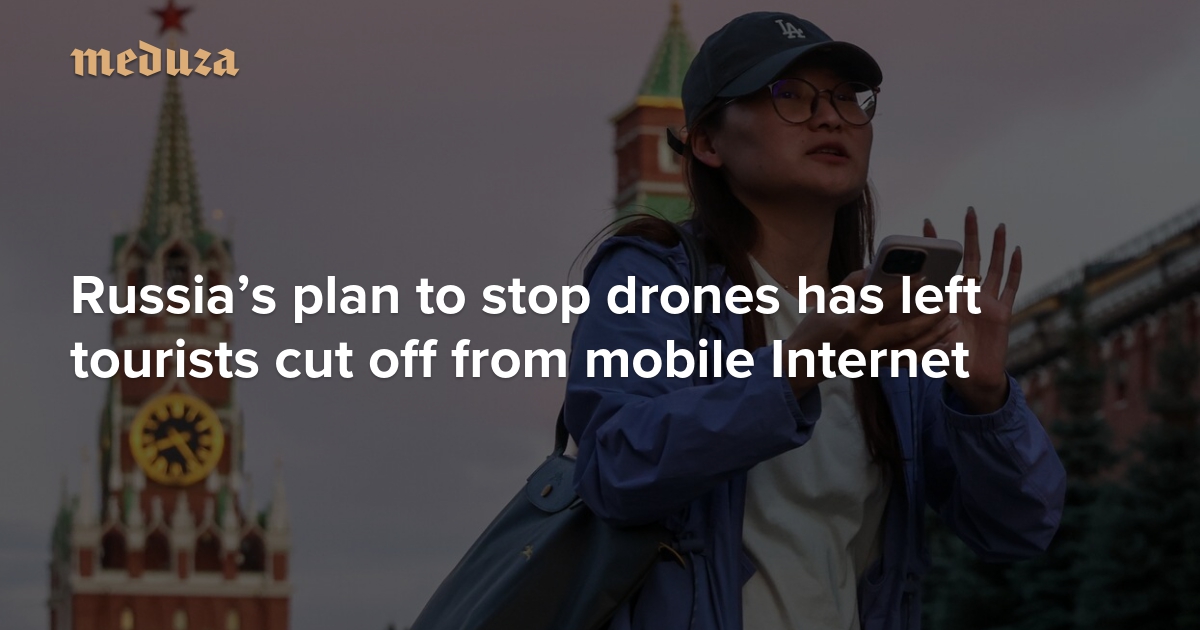Earlier this month, Russian telecom operators began rolling out a so-called “cooling-off period” for all foreign SIM cards — a 24-hour blackout on mobile Internet meant to curb drone activity near the country’s borders. But by mid-month, it was clear the system was in shambles: most operators couldn’t lift the block once it was triggered, and the restrictions ended up affecting not just mobile data but text messaging as well. In the name of security, the Russian authorities had effectively cut off foreign tourists from mobile Internet — and made life harder for some of their own citizens. Here’s what we know.
The idea of a “cooling-off period” for SIM cards first surfaced in early August 2025, when Russia’s Digital Development Ministry announced that it was considering the measure. Digital Development Minister Maksut Shadayev said the restriction was intended to “combat SIM cards used in drones.” According to him, mobile Internet access through foreign SIM cards would be unavailable for at least five hours after entering Russian territory. The exact length of the “cooling-off period,” he added, was still under discussion.
A source who spoke to Vedomosti explained that to regain Internet access, a foreign SIM card holder would have to complete a CAPTCHA on a special website. Drones, the source noted, wouldn’t be able to pass such verification. Still, Igor Bederov, head of information and analytical research at T.Hunter, told the outlet that the new restrictions wouldn’t fully eliminate the threat of drone attacks, since some drones could use Russian SIM cards or connect via other channels, including satellites.
Our only hope is you. Support Meduza before it’s too late.
The Digital Development Ministry did not say when the “cooling-off period” would take effect. But on October 6, several Belarusian telecom providers warned subscribers roaming in Russia about possible service disruptions. They later clarified that the block would last 24 hours and affect not only mobile Internet but also text messaging.
That same day, several Telegram channels reported complaints from users who were unable to access mobile Internet with foreign SIM cards, including eSIMs. Voice calls and regular SMS, however, still appeared to work. The channel Mobile Review claimed — without citing a source — that the new restriction had actually been in place for a week already in regions near the Ukrainian border.
Mapping Russia’s Internet blackouts The Russian authorities keep shutting down mobile Internet. Here’s where it happens most, and how the outages are spreading.Mapping Russia’s Internet blackouts The Russian authorities keep shutting down mobile Internet. Here’s where it happens most, and how the outages are spreading.
The Insider also noted some unusual technical aspects of the system. The “cooling-off period,” for example, could reportedly activate even when crossing borders between Russian regions. The monitoring project Na svyazi, which collects and verifies user reports of Internet outages, said that mobile Internet access would again be blocked if a device remained inactive for more than three days. The 24-hour timer also reset whenever the device switched to a different network — a common occurrence while roaming.
On October 14, Kommersant reported that Russian mobile operators were struggling to implement the new restrictions. According to one source, users were still unable to access mobile Internet even after their “cooling-off” period had expired — and SMS messages weren’t being delivered either.
Of Russia’s four major telecom providers, only T2 managed to set the 24-hour timer, a telecom insider told Kommersant. Even so, T2 users also experienced SMS disruptions. “Other operators didn’t have the technical capability to limit the block to a single day,” the source said, “so the data and SMS restrictions lasted for the entire time the foreign SIM card remained in Russia.” He estimated that it would take at least three to four weeks to get the system running properly.
Representatives of T2, MTS, MegaFon, and Beeline declined to comment on the issues. The Digital Development Ministry has also remained silent. In fact, it hasn’t even confirmed that the “cooling-off period” for foreign SIM cards is officially in effect.
‘We have the power here, don’t we?’ Anger over WhatsApp and Telegram call bans sparks rare protests in multiple Russian cities‘We have the power here, don’t we?’ Anger over WhatsApp and Telegram call bans sparks rare protests in multiple Russian cities
While the mobile Internet disruptions have mostly affected foreign visitors, the SMS delivery failures have also hit some Russians — particularly those who use bank cards issued abroad. Many opened foreign accounts to pay for international online services, but now they can’t receive text notifications such as verification codes from their banks.
For tourists traveling to Russia, the situation is even more complicated. To get online, they need a Russian SIM card — something that has become nearly impossible to obtain in 2025. Foreigners must first create a verified account on the Russian government’s public services portal Gosuslugi, submit a notarized translation of their passport, obtain a SNILS (similar to a social security number), provide biometric data, and then register it through a bank.
The entire process can take several days, and only after completing it can a mobile carrier sign a service contract. The requirements have proven so burdensome that, in early October, telecom providers reportedly asked the Digital Development Ministry to simplify the rules.
Even then, a Russian SIM card is no guarantee of Internet access. Since the summer, authorities across multiple regions have periodically shut down mobile Internet in an effort to counter Ukrainian drone attacks. During these blackouts, only websites included on so-called “whitelists” — already being tested in many regions — remain accessible.
‘The whole country will feel it soon’ Meduza’s Russian readers on life inside the Kremlin-approved Internet‘The whole country will feel it soon’ Meduza’s Russian readers on life inside the Kremlin-approved Internet

